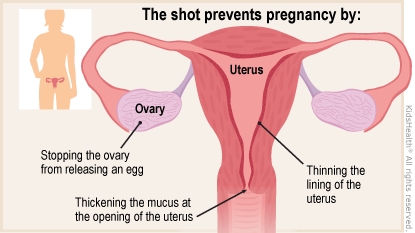Birth Control: The Shot
The birth control shot contains hormones that prevent pregnancy. If you get the shot every 3 months, it's a reliable form of birth control.


-
It's important to use a condom every time you have sex (vaginal, oral, or anal), even when you're on the shot, because:
-
Depending on where you were in your menstrual cycle when you got the shot, it might not work as birth control right away.
-
Condoms protect you from STDs (sexually transmitted diseases, also called STIs or sexually transmitted infections).
-
Using condoms while on the shot makes it even less likely that you will get pregnant.
-
Because the shot may cause weight gain or bone thinning, be sure to:
-
Eat a well-balanced diet that includes plenty of fruits and vegetables.
-
Drink water or nonfat milk instead of soda, juice, or other sugary drinks.
-
Include 1300 mg of calcium in your diet every day.
-
Take 600 IU of vitamin D each day.
-
Get lots of physical activity, especially weight-bearing exercise (which helps build strong bones) such as walking, dancing, and climbing stairs.
-
Make an appointment for 3 months from today for your next shot.
-
Don't smoke. Smoking puts you at risk for serious side effects from the birth control shot and many other medical conditions. If you need help quitting, go to teen.smokefree.gov or call 1-800-QUIT-NOW (800-784-8669).

-
You have cramping, spotting, or irregular bleeding that continues after 3 months from your first shot.
-
You have heavy bleeding (soaking through a pad or tampon every hour for more than 2 hours).
-
Your mood is affected by the birth control shot.
-
The area where you got the shot is painful or red for more than a week.
-
You have signs of an STD (such as belly pain, fever, abnormal discharge, pain when peeing or having sex, or genital warts or sores), or if you had sex without a condom and are worried you could have an STD.
-
You start any new medicines, including antibiotics and herbal or natural medicines. Some can make the shot not work.
-
Your skin or eyes look yellow, which can be signs of liver problems (a very rare side effect of the birth control shot).

You have lower leg pain, chest pain, trouble breathing, weakness, tingling, trouble speaking, or vision problems. These can be signs of a blood clot, which is an extremely rare side effect of the hormones in the birth control shot.

How does the birth control shot prevent pregnancy? The shot:
-
prevents an egg from being released by the ovary
-
thickens the mucus at the opening of the uterus so that sperm can't get in
-
thins the lining of the uterus so that a fertilized egg can't attach to the wall of the uterus
What are the side effects of the birth control shot? The most common side effects are:
-
irregular or no periods
-
weight gain or bloating
-
nausea, headaches, dizziness, or breast tenderness
-
mood changes such as nervousness or sadness
-
a lump or dent where the shot was given
The shot may cause bone thinning. Although studies show that the bones may recover once someone stops getting the shot, it's important to talk to your health care provider about this side effect.
What if I have sex before the shot is working and I don't use a condom or it breaks? Emergency contraceptive ("morning after") pills are available at the pharmacy without a prescription or ID. They delay ovulation (the release of an egg). This way there is no egg for the sperm to fertilize. If the egg was already fertilized and implanted in the uterus wall, emergency contraceptive pills will not stop the pregnancy.